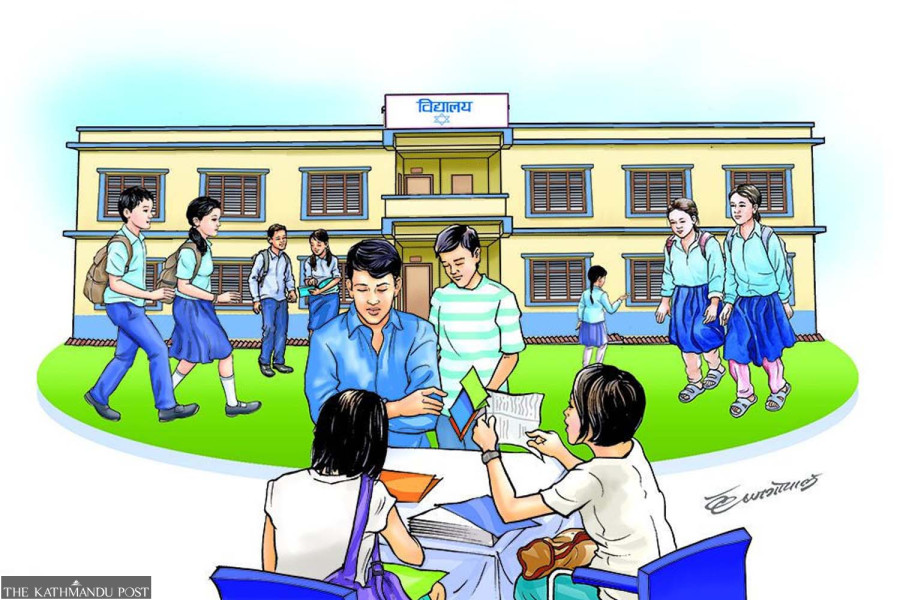National
School education bill favours existing private schools
The government registered the bill in the federal parliament, removing some provisions that school operators had contested earlier.
Post Report
The government on Wednesday registered the School Education Bill in the House of Representatives, withdrawing the provisions of the previous bill for mandatory conversion of the existing private schools into trusts.
Last month, the government backed off from registering the bill following strong reservations from private school operators over the provisions that said the existing private schools registered under the Company Act must be converted into trusts within five years. The new bill leaves it up to the existing schools whether or not to convert into trusts.
"Our reservation in the previous bill was regarding the ownership, which has been corrected now," DK Dhungana, chair of the Private and Boarding Schools' Organisation, told the Post. "We welcome this bill."
The bill makes it difficult for new entrants in the private education sector as the schools to be opened after the bill’s passage need to be registered as trusts. This could potentially curb competition among the education providers.
Educationists say the government worked at the behest of the school operators by discouraging the entry of new ones. The new provision will favour the cartel of the existing schools, Pramod Bhatta, who has conducted extensive research on Nepal's education, told the Post.
The High Level Education Commission in 2019 recommended converting private schools into trusts within ten years. The report, prepared during the tenure of then-prime minister KP Sharma Oli and which the private school operators had strongly resisted, was never made public.
Bhatta said the central problem in the bill is its failure to set minimum criteria for establishing schools. "Scores of schools do not meet the minimum standards of teaching-learning. The bill must have listed such standards and given a deadline to meet them or face action," he said.
The bill also proposes reviving the Education Offices at the district level that were scrapped with the promulgation of the constitution in 2015. The new charter institutionalised federalism and ended the existence of districts as administrative units.
The umbrella bodies of the local units have criticised the move, saying it is a regressive step. Such offices, the bill envisions, will be responsible for boosting the quality of education, maintaining records, carrying out school mapping and monitoring the schools in coordination with the respective local governments. Through the bill, the government plans to delegate the authority to the district offices to prepare school test papers.
"Despite our repeated concerns, the federal government wants to reinstate district-level education offices. The bill, on the one hand, says local governments bear the authority to manage school education while giving responsibility to monitor schools and prepare questions to such offices. This is unconstitutional and unacceptable," Khim Bahadur Thapa, general secretary of the National Association of Rural Municipalities Nepal, told the Post. "We will formally denounce it."
Allowing district education offices to prepare the question sets is against the very principle of evaluation, according to Bhatta. "Only those who teach (teachers), can evaluate their students rightly," he said.
The district education offices were reduced to smaller education units after the Local Governance Act, prepared based on the new constitution, came into force in 2017.
The Department of Education, renamed the Centre for Education and Human Resource Development five years ago, will also be revived, as per the bill.
The new bill will be presented at the House, where it will be discussed before lawmakers file amendments to it. It has to pass both chambers of the federal parliament before it becomes the law and replaces the Education Act-1971. A federal education Act is necessary to implement the educational provisions enshrined in the constitution. In its absence, the devolution of the authority to the local and provincial levels has not been possible. Despite commitments from successive governments, it took around eight years to finalise the bill.
If the bill gets endorsed, the national-level board exams will be conducted only at the end of grade 12. It doesn't talk about the Secondary Education Examinations, which means respective schools will be giving the test. The local units will hold the grade eight tests, though the authority to prepare the question sets lies in the district education offices.
The previous bill allowed the provincial boards to conduct the grade 10 tests.




 9.7°C Kathmandu
9.7°C Kathmandu













